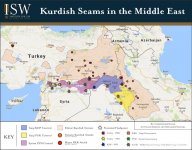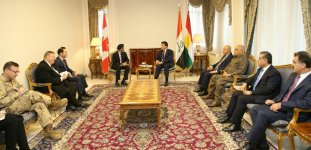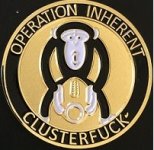Brigadier-General Shane Brennan, Commander JTF-I
Thank you Mark, and thanks to all of you for taking part in this update. I am Brigadier-General Shane Brennan, Commander of the Canadian Armed Forces’ Joint Task Force – Iraq.
Before I begin, I will take the opportunity to thank all Canadians for their ongoing support to our personnel and to this mission. Our men and women come from military units across the country, from St. John’s Newfoundland to Comox, British Columbia. To the families of our brave members here: your loved ones are making a huge difference. Their sacrifice and hard work help the Coalition and most importantly our Iraqi partners, fighting to defeat Daesh and re-establish security and stability in their country. Equally important, your own personal sacrifices and support to your serving loved ones are essential, and for that I want to offer you my most sincere thanks, especially as we just passed a traditional holiday period where families normally gather.
On the mission itself, I first will use this occasion to communicate what Canada and Canada’s Armed Forces are doing in the region. We are working as part of a Coalition of countries, led by the US, with a common objective to remove the Daesh threat to ensure regional and international security. This work is complicated by the region’s complex geo-political context. As we have learned from the past, proper conditions need to be established for long term security and stability in a given country or region. Canada has been supporting and continues to support the establishment of these conditions, but we cannot and should not engineer them for others. For durable and sustainable security and stability, this hard work has to be done by the individual nations themselves, such as Iraq. This is why the fight against Daesh and the efforts to bring stability in Iraq in the long term are directly conducted by the Government of Iraq. In doing so, the Government of Iraq has formally requested the presence and support of the Coalition, which takes a large degree of cooperation and teamwork in order to be successful. Canada is contributing to the Coalition mission and providing support to our Iraqi partners.
Now I will provide an overview of how the Canadian Armed Forces, through Op Impact, are contributing to this effort.
Currently Canada is contributing approximately 830 personnel serving in the region in Kuwait, Iraq, Qatar, Jordan and Lebanon. We are an important and committed partner and Canada’s military contribution is multi-faceted and valued by the coalition. This effort features a variety of military capabilities and expertise, which can be categorized and grouped as follows: air operations, provision of military leadership, staff expertise and specialist capability, regional capacity-building, targeting and intelligence operations, and finally logistical support elements. Of note, I will not be covering the Special Forces contribution as that will be covered at a later date.
Since Oct 2014, six out of seven days a week we have been conducting air operations with Aurora Intelligence, Surveillance and Reconnaissance aircraft from Greenwood and Comox, and Polaris Air to Air Refuelling aircraft from Trenton. They have both done tremendous work. The Aurora aircrews gather intelligence that directly informs the development and striking of Daesh targets, and the Polaris refuels Coalition fighter aircraft. To put this in perspective, the intelligence gathered by the Aurora was used to support the ongoing battle for Mosul and is now being used in a variety of other areas where Daesh is active. The Polaris Tanker has provided nearly 40 million pounds of fuel which equates to about 1500 coalition fighter jets being refuelled.
Another significant capability is provided by 430 Tactical Helicopter Squadron from Valcartier that has been providing tactical air transport for Canadian Special Operations Forces in the Erbil region of Northern Iraq.
Canadian military expertise has been assigned to numerous areas within the coalition effort. These include: the Ministerial Liaison Team, Role 2 hospital, the All-Source Intelligence Centre and personnel embedded in the Coalition HQs. I’ll briefly elaborate on these areas starting with the Ministerial Liaison Team:
This team is a Coalition organization currently under the leadership of Canadian Brigadier-General David Anderson. The team is formally embedded within the Coalition Joint Task Force in Baghdad and works directly with Iraq’s Ministries of Defence and the Interior to ensure that they are well-synchronized with Coalition efforts.
To the Role 2 hospital: As you may be aware, this past November we established a Coalition Role 2 medical facility in Erbil, northern Iraq, for one year. With 50 Canadian Armed Forces members deployed to this facility, it provides two operating rooms, two surgical teams – including an Allied surgical team, and intensive care support. These capabilities allow it to provide resuscitation and life-saving medical services for Canadian, Coalition and Iraqi troops, and whoever requires medical attention under international law.
Joint Task Force - Iraq Headquarters is where I’m situated and is the command element of Op Impact. With the support of staff and advisors representing the Navy, Army, and Air Force, the HQ oversees the execution of the Canadian mission.
This headquarters includes and provides direction to an All-Source Intelligence Centre (ASIC), which has been in operation since May of last year. It is responsible for collecting, synthesizing, and analyzing information derived from a variety of sources, which is used by the Coalition for situational awareness. This information is used to develop targets for the Coalition. These targets, when struck, degrade Daesh’s ability to operate, and the ASIC is therefore central to Canada making a substantive and direct contribution to the fight against Daesh.
We also have individual Canadian Armed Forces members embedded within other Coalition headquarters across the region. They provide expertise that is in high demand, such as planning, logistics, targeting, engineering and communications.
Moreover, we have established two Canadian Training Assessment Teams working to enhance our cooperation with Jordan and Lebanon. They are both working with their respective Host Nation military on developing projects to support improving and assisting their security forces.
Of note, our team in Jordan has assisted in Canada’s contribution by facilitating training, providing materials and supplies used in the enhancement of defensive structures, and the provision of equipment such as high-quality rain gear to the Jordanian Armed Forces, all in an effort to stop Daesh infiltration along the Jordan-Syria border.
In Lebanon, our team has so far contributed to Canadian procurement of essential equipment such as winter and mountain gear for the Lebanese Armed Forces. This project aims to increase the capacity of Lebanon’s forces to be effective in its fight against Daesh along its border with Syria.
When deployed, we always work to ensure that each of our members are kept safe, healthy and well equipped to carry out their mission. In these capacities we have logisticians, engineers, medical personnel and other specialized professionals who work on a 24/7 basis to deal with all of these special requirements. Without their support and tireless effort the mission could not be successful.
In summary, you can see that Canada has been an active and meaningful contributor within the coalition supporting Iraq Security Forces in the fight against Daesh and efforts to foster regional security and stability.
Over the course of the campaign we have seen the situation change for the better as Iraqi Security Forces have continued to clear Daesh elements from their footholds across the country. For the future, it will continue to take a joint, coalition team to be successful. Brigadier General Steve Kelsey will be able to expand on these positive messages.
I will now turn over to Gen Steve Kelsey, - Steve over to you.
Brigadier-General Stephen Kelsey
Thank you General Brennan and good evening from Baghdad,
This is Brigadier-General Stephen Kelsey and I am the Canadian Chief of Staff embedded in the Combined Joint Forces Land Component Command, or the coalition Land HQ for Operation INHERENT RESOLVE. Our multi-national headquarters represents a coalition of 19 different countries that works closely with our Iraqi Security Force partners to coordinate the employment of land forces on behalf of the overall Combined Joint Task Force, but importantly, the Government of Iraq.
I’ll now use this opportunity to provide an update on the Iraqi-led operations to liberate Mosul.
The assault to recapture Mosul began on 17 October 2016 and the ISF are 101 days into the fight. After conducting operations for about six weeks an operational refit occurred before combat operations resumed again on 29 December. Since that time, Iraqi Security Forces continued with great success to clear sectors of East Mosul on three axes; the Iraqi Army from the north, the Iraqi Counter-Terrorist Service from the east, and the Federal Police with the Iraqi Army from the south-east. The Coalition land component contribution to combat operations in East Mosul remains, through: Intelligence, Surveillance and Reconnaissance; stand-off direct and indirect fire systems; and, through embedded Advise & Assist teams within Iraqi Security Force at the Division and Brigade level. As all are likely aware, Prime Minister Abadi formally announced on 24 January that Iraqi Security Forces have liberated East Mosul. This is a significant achievement for the Government of Iraq and the Iraqi Security Forces, and a momentous step towards the defeat of Da’esh, but of course there is much work that remains.
The focus of ISF operations is now squarely on consolidating the security environment in East Mosul, supporting the population, and now setting condition for the next phase which is the liberation of West Mosul.
Fighting in Mosul has resulted in Internally Displaced Persons or IDPs. There are a number of IDP camps that have been established which are currently under capacity. The number of people in IDP camps around Mosul is around 135,000. With the success in Eastern Mosul, IDPs will be encouraged to return to their homes as soon as it is safe to do so in their neighborhoods, and the living conditions are suitable. The number of IDPs that have returned to liberated areas of Mosul is about 26,000. Current available capacity in IDP camps in Northern Iraq sits at around 58,000, with even more under construction.
While the main effort of the Iraqi Security Forces and by extension the Coalition remains Mosul, counter Da’esh operations continue in Iraq including, the Tigris River Valley (North of Baghdad to Qayyarah), the Euphrates River Valley (Ramadi West toward Haditha and Rawah), and here in Baghdad. The coalition is also very much focused on assisting the Iraqi Security Forces to sustain combat operations but re-establish also law and order, through a process the coalition refers to as Building Partner Capacity. Training is delivered on average, to 4,500 Iraqi soldiers and Federal Police every week at five training sites across the country. Courses include Basic and Advanced Infantry, Combat Life-Saving, Explosive Hazard Awareness, Military Engineer and Law Enforcement to mention a few.
I think I’ll close out this brief update by underscoring the remarkable transformation of the Iraqi Security Forces and in particular the Iraqi Army. The ISF are enjoying significant success and together with the other coalition partners, we remain united in our resolve to defeat Da’esh. This concludes my statement and I will now hand the call back to the moderator.



